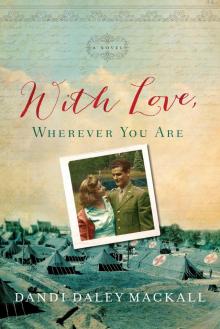- Home
- Dandi Daley Mackall
With Love, Wherever You Are Page 2
With Love, Wherever You Are Read online
Page 2
By the time Doc had the leg wrapped, Ma was struggling to get up. “Thank you, Dr. Roberts. I’m fine now.” Her voice sounded pinched, words squeezed through a hole. “Who found me?”
Helen felt the doctor’s hand on her head. “Your Helen found you, and it’s a good thing she did. You’d have bled to death if it hadn’t been for little Helen here.”
“Eugene and I both found you.” Helen tossed her brother a grin.
“Well, I hope I didn’t give you a scare,” Ma said.
“I’ll tell you this, Mary. You’ve got a nurse here. I couldn’t have stopped that bleeding any better myself.” He squatted down to Helen’s level. “Miss Helen, I’m going to make you a promise. I’ll do everything I can to get you into nurse’s training after high school.”
Helen felt heat rise to her face. Except for Dr. Roberts and their teachers, of course, she didn’t know anybody who’d gone to school past high school. She frowned up at him, unwilling to be teased. “Really, Dr. Roberts?”
“Really.”
It was all the good Helen would ever need, hearing that. But there was more.
“Helen Marie Eberhart,” Dr. Roberts said, helping her to her feet, “someday you’ll go off to the best nurse’s training in the country. Then you can come back here and be my nurse. How’s that sound?”
Helen smiled. “It sounds good.” Half of Doc’s prophecy sounded better than good. She would become a nurse, the best nurse she could possibly be. But she wasn’t coming back to Cissna Park, Illinois. There was a whole world out there, and she was going to be part of it.
Now, as Helen stood outside hospital room 301 and straightened her uniform, repinning her nurse’s cap, she doubled the promise she’d made herself almost a dozen years ago. She was going to be a nurse. And she was going to see whatever there was to see in the world.
Maybe Eugene was right. Maybe she was a gypsy after all.
Cissna Park, Illinois
20 December 1941
Dear Helen . . . or shall I say “Nurse Eberhart”?
I received your letter of 10 December and thank you kindly for taking the time to write it. I understand better than most, I believe, the arduous schedule and the dearth of free time imposed upon a young woman in pursuit of her nursing degree, which I have no doubt you will achieve with honors.
Allow me to express my heartfelt agreement with your decision to complete your training. Do not permit that heinous Japanese emperor the victory of thwarting your plans to become a nurse. Did you hear that Harold Messner was killed in that terrible act of aggression in the Harbor? They say his ship was sunk with hundreds of boys drowned or burned. You probably knew Harold, Clive’s oldest. He dropped out of school and enlisted in the Navy last spring. I delivered that boy on the Messners’ kitchen table. His mother suffers heart palpitations, and I fear the depth of that poor woman’s grief.
I spoke with your own dear mother on Sunday following church. Your father was there, though not very talkative and rather eager to be off home. Mary’s worry over her boys shows in her countenance. Your brother Ed signed up the minute those bombs dropped in the Pacific. Left his tractor in the field and walked into town to enlist. Mrs. Messner said she saw him storming past their place on his way to the recruiting office, fist raised like he was looking for a fight. It’s a wonder they took him with those eyes of his, but he says he’s going to be an MP. I know your father would have preferred to keep his eldest down on the farm. But I can see Ed as military police, with his strong farm arms, can’t you?
As for the twins, your mother reports that Wilbur enlisted, but Walter was turned down for his epilepsy. Your mother says it has hit him hard, but something tells me that brother of yours will find a way to serve his country. I’ve always liked the twins, even though they gave me a time at delivery.
Eugene is pressing to sign up, but your father will soon be in a wheelchair, and someone needs to farm. Eugene isn’t Louis’s first choice, but he has ruled that Eugene will farm, though sons no longer listen to fathers as they did in my day.
Take care, my little Nurse Helen.
Respectfully,
Dr. John Roberts, MD
Helen Eberhart
Evanston, IL
Dear Eugene,
Don’t you dare! Do you hear me? Don’t you dare enlist, you knucklehead! Do I have to come down there myself and shake some sense into that thick head of yours?
Believe me, I get it. Dad can be . . . well, so Dad. He’s a hard man, and I’m sure he’s taking his frustration out on you. But you can’t leave Mom. And you can’t sign up to shoot people, Genie. Besides, with Clarence and Bud gone to the Pacific, Dad can’t get along without you, although he’d never admit it under torture.
Which reminds me . . . has Dad honestly been telling people that the Eberharts are not German, but German-Swiss? Is there really an “uneasiness” in Cissna Park about being German? That’s goofy! One glance through our small phone book from the Ackermans and Baumgartners, to the Kaufmans and Kruegers, all the way to the Weinigers and Zieglers, should assure everyone that we’re all in the same boat when it comes to proving whose side we’re on. What does Dad think will happen? Is he afraid they’ll round up American citizens just because their ancestors lived in Germany or Japan? That may be Hitler’s game, but surely it’s not ours.
Nurse Benchley said she’s thinking about enlisting in the Army as a nurse. Can you imagine that? If she does, she says she’ll try to get me on as head nurse to take her place on the floor, if I’ve gotten my degree by then. I don’t know if she really means it, but it’s a nice thing to say. And she doesn’t say that many nice things.
Eugene, think about Mom. Promise? She has enough to worry about with four sons in the war. If you leave, it will kill her. She needs you home. We all do. In some way I can’t explain, I need you home in Cissna.
Love,
Nurse Eberhart
ST. LOUIS, MISSOURI
DEC. 7, 1941
Frank Daley checked the chart at the foot of the old man’s hospital bed. Admiral Ralph Jacobs was the unlucky age of Frank’s dad, old enough to have caught action in the Great War, but young enough to still be in service for this whatever-it-was in Europe. That’s where the good admiral had picked up the nasty infection that had landed him here, in the disease ward of the Washington University hospital. Frank liked the fellow well enough, but it was hard to look the old codger in the face without laughing. The French were the ones people called “frogs,” but if any man ever deserved the name, it was this one, with his big, wrinkly eyes and sagging jowls that got lost in his bulbous neck.
Admiral Jacobs cleared his throat and struggled to sit up in bed. “Are you sure you’re a doctor? I’ve got boots older than you.”
“I noticed that when they brought you in, Admiral. Can’t the Navy afford new boots for its admirals? What do lowly sailors do? Go barefoot?”
The admiral sputtered. Then his frog eyes lit up, and he almost chuckled.
Frank whipped out a wooden tongue depressor and told the admiral to open wide. “I’m a lowly intern, sir. If it makes you feel any better, my shoes are older than you.” He removed the tongue depressor and made a mental note of the swollen tonsils.
“Intern?” Admiral Jacobs scoffed. “Don’t know why they can’t get a real doctor in here instead of some kind of want-to-be doctor.”
“More like a going-to-be doctor.” Frank had three firm offers for residency, all from great hospitals, and three more from hospitals with great locations, like Miami. He loved the beach and thought that one day he might set up private practice in a city with gorgeous beaches.
“Hmmpf. What’s your name, son?”
Frank had given the man his name at least eight times in three days. He wondered if the old chap forgot locations and battle plans that quickly. “Frank R. Daley, soon to be known as Dr. Daley or F. R. Daley, MD.”
“The armed services can always use an almost-doctor. You ever picture yourself enlisting?”
<
br /> “Only in my nightmares, sir.”
“You’ve got some lip on you.”
“So they say.” Frank took out the pen his sister, Dotty, had given him before he started med school and scribbled notes on Admiral Jacobs’s chart: Swollen tonsils. High blood pressure. Persistent fever. Forgetfulness. The man wouldn’t be leaving anytime soon.
“Pencils not good enough for you?” Jacobs snapped, pointing to the chart with the pencil dangling from a string.
“I like pens.”
“What if you make a mistake?”
“I don’t make mistakes.”
The admiral laughed, a croaking that ended in a cough.
Frank waited for the cough to ease. “You okay, sir?” He slipped the stethoscope from his neck to his ears and held the silver plate to the old man’s back. There was enough fluid in his lungs to launch a small ship.
“Fool question,” the man muttered. “Of course I’m not okay. Not with my ship dry-docked in Boston and my crew on leave. You boys in white better get me out of here and back—”
He was interrupted by the hospital’s loudspeaker. It crackled like it was on fire, then howled as if burned. Frank almost welcomed the interruption, which was usually a page for a surgeon or a general call for duty nurses to report to OR or ER.
“Attention, please. Could I have your attention?”
That was a new one. Frank recognized the voice of the chief of hospital staff, Dr. Macy. Old Mace never asked for attention; he demanded it.
“There’s . . . there has been an enemy attack on our forces. President Roosevelt reported that the Japanese have attacked Pearl Harbor. They’re saying it was a surprise air attack. There were multiple explosions . . . and fatalities.”
Voices clashed in the background, coming through the speaker system like thunder rumbling and lightning striking. Then Dr. Macy came back on.
“I guess . . . I mean, we’re hearing that our forces in the Pacific are under bombardment even now, as we speak. We don’t know what else is happening. Please carry on with your duties. We will keep you advised. And . . . and God bless America.”
Admiral Jacobs threw off his blanket before Frank could stop him. “Those sneaking, motherless . . . I have to get out of here! I need to get to my ship.”
“Admiral, get back in bed.” Frank had to forcibly hold the man down until he quit fighting. “Sir, you’re not going to help anybody until we get you well.” The admiral was a lot stronger than he looked. Or maybe Frank was as weak all over as he was in his knees. He had to steady himself against the bed rail. His mind wouldn’t stop spinning. It made him dizzy, and all he wanted to do was run out of the room and call home.
“They don’t know who they’re messing with.” The admiral coughed, then wiped his mouth with the back of his hand. “They’re in for a surprise themselves. We’ve got fleets in the Pacific, just waiting for those Japs to do something like this. They’re going to be sorry they ever—”
“Sir?” Frank couldn’t wait another second. “My sister’s in the Philippines.”
“What’s she doing there?” Jacobs demanded.
“She’s a nurse. Dotty joined the Army Nurse Corps in ’38. Last June she took an assignment to the Philippines.” Frank stared at the admiral, barely seeing him. “She loves it there, taking care of malaria patients, going to after-duty dances. She met a guy a couple of months ago, a lieutenant.” His throat felt tight. Dotty, his big sister, was barely five feet tall, too small to be in the thick of . . . whatever this was. “What’s going to happen to her?”
“Now, son, don’t you worry. The Philippines aren’t in Hawaii.” He pronounced it Ha-why-ya. “Not even close to Pearl Harbor.”
Frank could feel his heart slow down. The sounds around him came into focus—shouts from the hall, the clatter of a meal tray, a scratching from somebody’s radio. Ordinary sounds. Normal sounds.
Jacobs smiled, and the frog lines disappeared. He looked like somebody’s kindly grandfather, the one everybody would get to dress up like Santa Claus at Christmas. “Don’t you worry. This whole mess will all be over in a couple of weeks. Three weeks at the most. That’s how long it should take our Navy to get to Japan and kick them across their own country and all the way to kingdom come. We’ll show ’em not to mess with our boys. You’ll see.”
Frank wanted to believe him. And why not? He was an admiral in the United States Navy.
“Son, trust me. Three weeks, and this show will be over. Now, get me out of here.”
To: Lt. Dorothea Daley APO Philippines
From: Frank Daley
Dear Dotty,
Sis, what have you gotten yourself into now? I know you wanted to travel, but this is ridiculous. A week ago, all we heard in the papers was how we’d beat back the Japanese and the whole thing would be over in nothing flat.
Dad said you couldn’t get newspapers on the island, but I’m sure you’ve heard we’ve declared war on Germany and Italy, too. That Miss Rankin from Montana was the only dissenting vote in Congress when FDR got the declaration of war against Japan. What is wrong with that woman?
With the draft like it is, every intern and resident I know has signed up for deferment, which means I’ll get to complete my residency as long as I agree to show up for basic the day after I finish. Fine with me. I can’t imagine the world will keep fighting that long. Even Jack and I can’t keep fighting that long.
You remember my buddy Anderson? I brought him home for Thanksgiving right before you set out for the Philippines. He gets the New York Times, and they’re saying we’ve checked the Japanese on land and have sunk three of their ships. I guess we’re chasing Japanese warships all over the Pacific while our fighter pilots are doing what we pay them for. So that sounds pretty good, if you ask me. (Nobody is asking me, strangely enough.)
Talked to Jack this morning. He was very mysterious about where he was calling from, but it sounded far away. I’m telling you, our brother is a spy, or my name’s not Frank the Great. His sources tell him the Japs dropped bombs on Clark Field, where your “Boots” is. Hopefully you’ve seen Boots or heard from him by now. Let us know, will you? We’re awfully worried about this guy we’ve never met.
You know how I told you I didn’t pray much? I’m rethinking that one.
Stay safe, Dotty,
Frank
Not that far from Manila
From: Lt. Dorothea Daley
Dear Frank,
I don’t know if you’ll ever get this letter. No post offices in the jungle. Sometimes I give a letter to a soldier, or leave one with a patient.
Merry Christmas. Things aren’t good here, but could be worse. Two of our nurses at Camp Hat were captured, and five in Guam.
I can’t describe how surprised we were when we heard the bombs fall here at Fort Stotsenburg. The night before, we’d all been dancing. I got to the hospital early and was there when the first wave of bombs hit. It felt like an earthquake. I had no idea bombs could feel like that—not just a big boom, but a violent shaking of everything.
I stayed on duty with a few other nurses for 48 hours—no sleep and no food. I never did get back to the dorm. Our little 200-bed hospital got 500 patients from Clark Field almost instantly. When the first casualties arrived, I kept asking about Boots. I lifted every sheet, unzipped every body bag. He wasn’t there, thank God.
When we ran out of space in the hospital, the tropical disease patients, all on their own, walked out to go fight. Bernie and I were the last two to leave our post. I only left because I fell asleep standing over an open wound and nearly put my head in some soldier’s chest. I guess it’s time to go when that happens. We couldn’t return to the barracks, and we didn’t want to get far from the hospital, so we crawled into a space in the airway under the hospital and took turns catching a little shut-eye. We barely fit, one lying down, one sitting up. I always knew being this small would come in handy.
I pray Boots is all right. Haven’t heard from him in 11 days. I love him, lit
tle brother. I should have told him when I had the chance. I’m going to marry that guy the next chance I get. Maybe we’ll meet up in Bataan. MacArthur ordered us to leave Manila for the peninsula so we can man the emergency hospitals. Unfortunately, Mac wasn’t exactly specific on how we’re supposed to get there.
Be good,
Dotty
From: Lt. Dorothea Daley Engel
Dear Frank,
This whole island has been under attack since Jan. The commander of the Philippine forces, Wainwright, rode through on his horse and ordered us nurses to evacuate or be Japanese prisoners. Then he and the soldiers left by boat.
We did what we could for our patients, carrying and dragging them on stretchers made of branches. None of us is strong anymore, but we hauled as many as we could deep into the jungle with us. The ambulatory patients helped. We’ve been hiding out here for weeks, with nothing but rice and an occasional drop of meat “of undetermined origin.” We told Franny, who does most of the cooking, not to tell us where our cute pet monkeys have gone.
Boots showed up, thank God (and I mean that!). He made it through the first three attacks by the skin of his teeth—powder burns on his uniform to prove it. He comes and goes (mostly goes, fights, comes back). He asked me if I’d gotten to meet General Wainwright. I told him, “No, but we ate his horse.” True story.
I am now Mrs. Emanuel Engel, wife of “Boots.” On Feb. 19, 1942, Father Cummings pronounced us husband and wife. We started the ceremony in our makeshift hospital and ended the service in a foxhole, when somebody over-celebrated, I guess, and dropped bombs so close the dirt in the foxhole covered my bridal khakis. Good thing I wasn’t wearing a wedding dress.
After a wonderful six-hour honeymoon (which you’re too young to hear about), the groom returned to duty at the beach defenses in Mariveles. I hardly ever saw him until he showed up in the hospital with malaria. Then we saw each other for a week straight. What kind of a war is this when your husband getting malaria is good news?

 Just Sayin'
Just Sayin' Eager Star
Eager Star Gift Horse
Gift Horse Cowboy Colt
Cowboy Colt Natalie and the Bestest Friend Race
Natalie and the Bestest Friend Race Buckskin Bandit
Buckskin Bandit With Love, Wherever You Are
With Love, Wherever You Are Runaway
Runaway Horse Gentler in Training
Horse Gentler in Training Crazy in Love
Crazy in Love Dreams of a Dancing Horse
Dreams of a Dancing Horse The Silence of Murder
The Silence of Murder The Secrets of Tree Taylor
The Secrets of Tree Taylor Night Mare
Night Mare Natalie Wants a Puppy
Natalie Wants a Puppy Bold Beauty
Bold Beauty Larger-Than-Life Lara
Larger-Than-Life Lara My Boyfriends' Dogs
My Boyfriends' Dogs Dark Horse
Dark Horse Horse Dreams
Horse Dreams Friendly Foal
Friendly Foal Unhappy Appy
Unhappy Appy Mad Dog
Mad Dog A Horse's Best Friend
A Horse's Best Friend